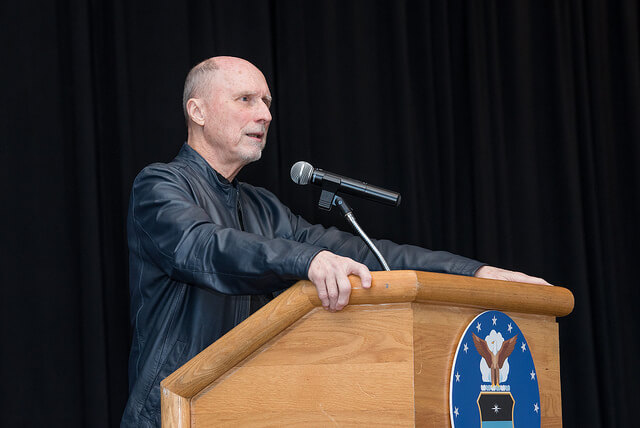Pulitzer Prize-winning author tells Academy cadets to ‘stand for the innocents’ at ‘War, Literature & Arts Conference’

Author Robert Olen Butler gives the keynote presentation during the U.S. Air Force Academy’s “War, Literature & the Arts Conference” Sept. 21, 2018 in Arnold Hall. The Pulitzer Prize-winning author and Vietnam War veteran spoke about the importance of service members and cadets maintaining a hold on their humanity during conflict. (U.S. Air Force photo/Trevor Cokley)
Story by Ray Bowden, Sept. 25, 2018
U.S. AIR FORCE ACADEMY, Colo. — Author Robert Olen Butler’s military service in Vietnam as an enlisted intelligence officer and translator ended in 1971, but the country still has a hold on him.
The Pulitzer-Prize winning novelist’s keynote presentation at the “War, Literature & the Arts Conference” encouraged cadets and service members to embrace their humanity September 21 at the Air Force Academy.
The duty of the Academy, Butler said, is to “make sure everyone stays human even as they carry out the most difficult missions.”
“It’s more important than ever as man shifts from identifiable battle zones,” he said. “We must stand in for the innocent on both sides.”
Butler’s writing is often influenced by his time in Vietnam. His short-story collection, “A Good Scent from a Strange Mountain,” tells the story of Vietnamese immigrants and earned him the Pulitzer in 1993. His latest novel, “Perfume River,” dissects the effects of the Vietnam War on an American family.
“Those experiences on the far side of the world shaped, expanded and guided me,” he said.
During his presentation in Arnold Hall, Butler shared his memories of the Vietnamese while wandering the streets and “crouching in back alleys.”
“In every place I went, the war was never discussed,” he said, explaining that these conversations revolved around every-day affairs and “our families, our mythos.”
Butler said he was taken aback by the Vietnamese.
“The Vietnamese were the warmest, most open and welcoming people I’ve ever met,” he said.
Butler said he didn’t feel any conflict during his time in Vietnam.
“The Vietnamese people opened me up to the essence of our shared humanity,” he said.
Several people in his audience chuckled when Butler admitted that during his first of four return trips to Vietnam, he learned his favorite hangout had been more than he’d thought.
“That bar was a prime meeting place for the Viet Cong,” he said.
The Academy’s mission of developing leaders can only be achieved through an understanding of the liberal arts, said Cadet 1st Class John Gnan, one of the conference’s organizers.
“Whatever mission or role you play in the service, it is ultimately to help America fight and win its armed conflicts,” he said. “It is also absolutely crucial we cling to our humanity. There is nothing more important.”
Gnan said the conference and other liberal arts events at the Academy show that the institution works to produce empathetic officers.
“It says at least to some degree, that institutionally we want to produce men and women who not only have the hard skills to be leaders in this Air Force, but people who can truly ‘feel,”’ he said. “We mean it when we say it’s important for leaders to be empathetic people and humans first. I hope this conference was a sobering reminder of the importance of being a person first and it causes us to realize how little we really know.”
Editor’s note: Along with Butler, the conference featured Pulitzer Prize-winning author Suzan-Lori Parks; former Air Force explosive ordnance officer and nonfiction author Brian Castner; filmmaker and cultural anthropologist Meg McLagan; Iraqi-American poet Dunya Mikhail; award-winning journalist Helen Thorpe; poet Brian Turner; and many more internationally-celebrated artists and scholars. The Academy’s international journal of the humanities, ‘War, Literature & the Arts’ was founded in 1989 for humanities students and faculty across the globe.